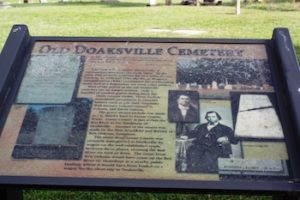
Doaksville Cemetery display, OK
*Wallace Willis's birth is celebrated on this date, c. 1820. He was a Black Native American farmer and lyricist.
Wallace Willis was born on a plantation in Holly Springs, Mississippi. Wallace “Uncle” Willis and his wife, Aunt Minerva, were slaves of Britt Willis, a wealthy half-Irish, half-Choctaw farmer. When the United States government relocated the Choctaws as a result of the Indian Removal Act, Britt Willis walked the Trail of Tears with his Choctaw wife to Oklahoma’s Indian Territory. Among the 300 slaves that made the trip with Britt were Wallace and Minerva.
The group settled near Doaksville, Oklahoma, near Hugo and Fort Towson. Wallace composed “plantation songs” while working in Britt Willis' cotton fields. Britt’s granddaughter, Jimmie Kirby, recalled: “Mama said it was on a hot August day in 1840. They were hoeing the long rows of cotton in the rich bottomland field. No doubt Wallace was very tired. They worked in the fields from sun-up to sundown. And sundown was a long way off. South of the field, he could see the Red River shimmering in the sun. Can’t you imagine Uncle Wallace suddenly tired of it all?” Two songs included "Swing Low, Sweet Chariot" and "Steal Away to Jesus."
Before the American Civil War, Willis and his wife, Aunt Minerva, were sent by their owner to work at the Spencer Academy, where the superintendent, Reverend Alexander Reid, heard them singing. In 1871, Reid was at a performance of the Jubilee Singers of Fisk University and thought the songs he had heard Willis’s singing would be good for the Jubilee Singers. He furnished them to the group, which performed them in the United States and Europe. Wallace Willis’ musical contributions live on far past Civil War America. His songs of hope, freedom, and faith resonate with generations of each passing era. Although Civil War-era documentation surrounding Wallace Willis is scarce, it is often reported that Willis and Minerva lived out their lives in Old Boggy Depot after emancipation in America.
Willis died in 1880, probably in Atoka County, Oklahoma. He was a Black Choctaw freedman living in the Indian Territory, now Choctaw County, near Hugo, Oklahoma. He is credited with composing several Black spirituals. Most historians believe Wallace is buried in an unmarked grave within the slave burial section of the old Doaksville Cemetery.